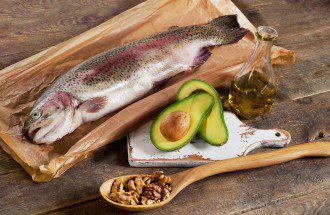6th July 2016
Contributing writer for Wake Up World
I remember as a teenager in the 80s how low-fat diets were all the rage in the United States. Suddenly, a slew of ‘healthy’ convenience foods were lining the supermarket aisles — from cookies to snacks and everything in-between. Low-fat cooking was championed and labels suggested reduced-fat products were the holy grail of health — guaranteeing a life free of disease and excess weight. And so it went. People jumped on the low-fat bandwagon and never looked back — that is, until waistlines expanded and general health took a nose dive. After years of low-fat living, people were fatter and more disease ridden than ever before. So what happened?
Besides substituting refined sugar for fat in processed foods — and people consuming more of these foods in general — researchers were stumped as to why low-fat diets were such a dismal failure on the health and obesity front. Observing the traditional French diet — a way of eating notoriously high in fat — and the exceptional health enjoyed by French people in general, the mystery slowly began to unravel. Eventually, acceptance of the notion that low-fat diets promote health was abandoned and the opposite was embraced: high-fat diets are not only healthy, but encourage longevity to boot.
[pro_ad_display_adzone id=”110028″]
Diet trends — which are healthiest?
Whether looking to shed a few pounds, improve cardiovascular health or reduce the risk of cancer and diabetes, the range of specialty diets is staggering. A Primal diet (often known as Paleo) eliminates grains, beans and dairy in favor of grassfed meats, fats like coconut and olive oil, non-starchy vegetables, berries, nuts and seeds. Atkins and The Zone by Barry Sears are the most well-known low-carb programs, while the South Beach Diet is a bit of a hybrid — high fiber, low-glycemic carbohydrates, unsaturated fats and lean proteins make up its bulk.
Low-glycemic foods do not encourage a dramatic spike in blood sugar levels — positive news for those with diabetes, insulin resistance or weight issues because these foods do not overly tax the pancreas. So far so good.
A common mistake with low-carb diets is that people tend to replace carbohydrates with protein. When we consume excessive protein, kidney function is stressed. Research has also shown excess protein in the diet can contribute to higher rates of cancer and heart disease. Moreover, high-protein diets can promote irritability, brain fog, fatigue, depression and insomnia. How? By increasing the stress hormone cortisol and reducing gamma-aminobutyric acid (GABA) in the brain. Lower than normal levels of this important neurotransmitter are associated with depression, anxiety and sleep disorders.
Interestingly, eating high amounts of protein can disrupt blood sugar levels as well since an overabundance of protein is converted into glucose by the body, albeit less dramatically compared to carbohydrates. The liver essentially converts the amino acids found in protein into sugar during a process called gluconeogenesis.
So where does this leave us?
According to the latest research, a diet that provides 50 – 80 percent of calories from fat is ideal for health and longevity. But it’s important to realize that not all fats are created equal.
Quest for the perfect diet
Over the last several years, there has been quite a stir about ketogenic diets in relation to preventing and treating some of the most deadly diseases of our modern era. Usually known for its success with treating epileptic seizures, researchers are now discovering the diet is effective for deterring cancer, stroke, obesity and insulin resistance. A ketogenic diet has also shown promise with Alzheimer’s and Parkinson’s. Additionally, the high-fat diet encourages an increase in muscle mass and fosters longevity.
“Recent research has found about a dozen genes associated with longevity. The primary function of one of these genes is to cripple the degradation of branched-chain amino acids, such as leucine, which can be useful for building muscle mass. Interestingly, in one of his books, Jeff Volek, Ph.D.,registered dietitian and professor in the Human Science Department at Ohio State University, mentions that ketones share a close structural similarity to these branched-chain amino acids, and seem to be preferentially metabolized. In other words, ketones spare those branched-chain amino acids, leaving higher levels of them around, which promotes longevity and increased muscle mass.” [source]
To reap the advantages of a ketogenic diet, it’s important to keep the following in mind:
- Avoid processed vegetable oils like canola, safflower and corn. But do consume plenty of natural, unprocessed fat, like those found in nuts, seeds, grassfed organic butter or ghee, avocado, as well as olive and coconut oil.
- Restrict non-fiber carbohydrates. Examples include: sugar, soda, processed grains and flours, pasta, bread, cookies — basically anything that will be converted into glucose by the body.
- Consume plenty of vegetables — especially leafy greens and low-starch varieties. Even though vegetables contain carbohydrates, they will not negatively influence metabolism and are a crucial part of the diet.
“Your body can burn both carbs and fat, but your body will burn carbs first. As long as you’re eating carbs, your body will try to burn those first. … You have to try to oxidize them and burn them first. But if you’re carb intolerant, which is highly prevalent in this country [the United States], you can’t burn carbs, by definition, very well.
Your body then only has one alternative, and that’s to convert the carbs you eat into fat. That happens to a greater extent to folks who are insulin resistant or carb intolerant. That really sets the stage for a lot of metabolic problems. Again coming back to how do you train the body to burn more fat; it all starts with removing the availability of carbohydrate because, as long as it’s there, it’s going to take precedence, and will simultaneously inhibit burning of fat.
These are very sensitive and exquisite mechanisms in place for this to work. You eat just a single meal of carbs and your fat-burning shuts down right away.
This is why a diet low in non-fiber carbs works so well to shift fuel use over to fat. You restrict the amount of glucose and starches that you’re consuming, and your body naturally shifts over to preferring fat for fuel.” [source]
However, Dr. Mercola warns not to go overboard with reducing protein. He recommends “eating one-half gram of protein per pound of lean body mass per day, which for most sedentary folks is 40 to 70 grams, but this may be higher for athletes and larger individuals” to maintain proper nitrogen equilibrium.
All things considered, when we strike the ideal balance of burning fat for fuel — instead of carbohydrates — metabolism improves, energy levels rise, body fat melts away, longevity increases and brain function is strengthened. We also experience heightened mental clarity and enjoy enhanced athletic performance. Not bad for a few simple adjustments to our diet.
Article sources:
- www.nature.com/ejcn/journal/v61/n5/abs/1602557a.html
- www.ncbi.nlm.nih.gov/pubmed/3573976?dopt=Abstract
- www.health.harvard.edu/healthbeat/a-good-guide-to-good-carbs-the-glycemic-index
- www.ncbi.nlm.nih.gov/pmc/articles/PMC2367001
- www.nutritionandmetabolism.biomedcentral.com/articles/10.1186/1743-7075-4-5
- www.annals.org/article.aspx?articleid=717451&wptouch_preview_theme=enabled
- www.sciencedirect.com/science/article/pii/S0952327803002217
- www.articles.mercola.com/sites/articles/archive/2016/01/31/high-fat-low-carb-diet-benefits.aspx
About the author:
 Carolanne Wright enthusiastically believes if we want to see change in the world, we need to be the change. As a nutritionist, natural foods chef and wellness coach, Carolanne has encouraged others to embrace a healthy lifestyle of organic living, gratefulness and joyful orientation for over 13 years.
Carolanne Wright enthusiastically believes if we want to see change in the world, we need to be the change. As a nutritionist, natural foods chef and wellness coach, Carolanne has encouraged others to embrace a healthy lifestyle of organic living, gratefulness and joyful orientation for over 13 years.
Through her website Thrive-Living.net, she looks forward to connecting with other like-minded people from around the world who share a similar vision. You can also follow Carolanne on Facebook, Twitter and Pinterest.
Further reading from Carolanne Wright:
- Don’t Ask, Just Plant — Taking Back Our Food Sovereignty with Guerrilla Gardening
- Seed Bombs: A Creative (and Fun) Mission to Save the Bees and Butterflies
- Autistic Boy with Higher IQ Than Einstein Discovers Gift After Removal from State-Run Therapy
- Dr Sebi: The Man Who Cures Aids, Cancer, Diabetes and More
- Big Pharma and Organized Crime — They are More Similar Than You May Think
- Emotional Energetic Healing: The Future of Medicine is Here
- The Greenhouse of the Future: Grow Your Own Food Year-Round With This Revolutionary System
- CDC Concealed Link Between Thimerosal and Autism for Over a Decade, Forced to Release Incriminating Documents
[pro_ad_display_adzone id=”110027″]







